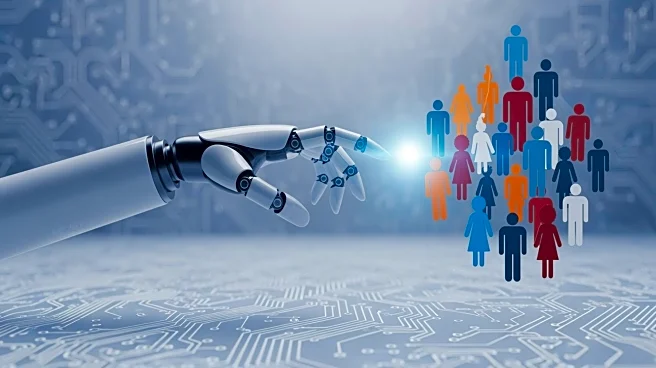What's Happening?
Citi Foundation has announced a $25 million initiative aimed at tackling youth unemployment and the disruptions caused by artificial intelligence in the labor market. The foundation will distribute half
a million dollars to each of 50 organizations worldwide that focus on providing digital literacy, technical training, and career guidance to low-income youth. This move comes as the unemployment rate for young degree holders in the U.S. reaches its highest level in over a decade, excluding the pandemic period. The initiative is part of Citi's Global Innovation Challenge, which seeks to prepare young people for a rapidly evolving job market. The foundation's efforts are in response to feedback from employers who have identified a lack of technical skills among early career applicants, as well as the need for soft skills such as teamwork and communication.
Why It's Important?
The initiative by Citi Foundation is significant as it addresses the dual challenges of youth unemployment and the impact of AI on the job market. With many entry-level roles being automated, there is a growing need for young job seekers to acquire both technical and soft skills. This funding aims to bridge the skills gap that has been identified as a major barrier to business transformation. By supporting organizations that provide training in AI and digital skills, Citi is helping to equip young people with the competencies needed to thrive in a changing economy. This effort could potentially lead to increased employability for young adults, particularly those from underrepresented communities, and help mitigate the economic impact of job displacement due to automation.
What's Next?
The organizations receiving funding from Citi Foundation will likely expand their programs to accommodate more participants, focusing on developing both technical and soft skills. As these programs roll out, there may be increased collaboration with businesses to ensure that training aligns with industry needs. Additionally, the success of this initiative could prompt other philanthropic entities and corporations to invest in similar workforce development programs. The broader impact on the labor market will depend on how effectively these programs can adapt to the fast-paced changes in technology and employment trends.
Beyond the Headlines
This initiative highlights the ethical and social responsibility of corporations in addressing the challenges posed by technological advancements. It underscores the importance of inclusive economic growth and the need to create pathways for all individuals to participate in the digital economy. The focus on soft skills also reflects a recognition that human qualities such as empathy and judgment remain crucial in an increasingly automated world. Long-term, this could lead to a more resilient workforce capable of navigating future disruptions.









